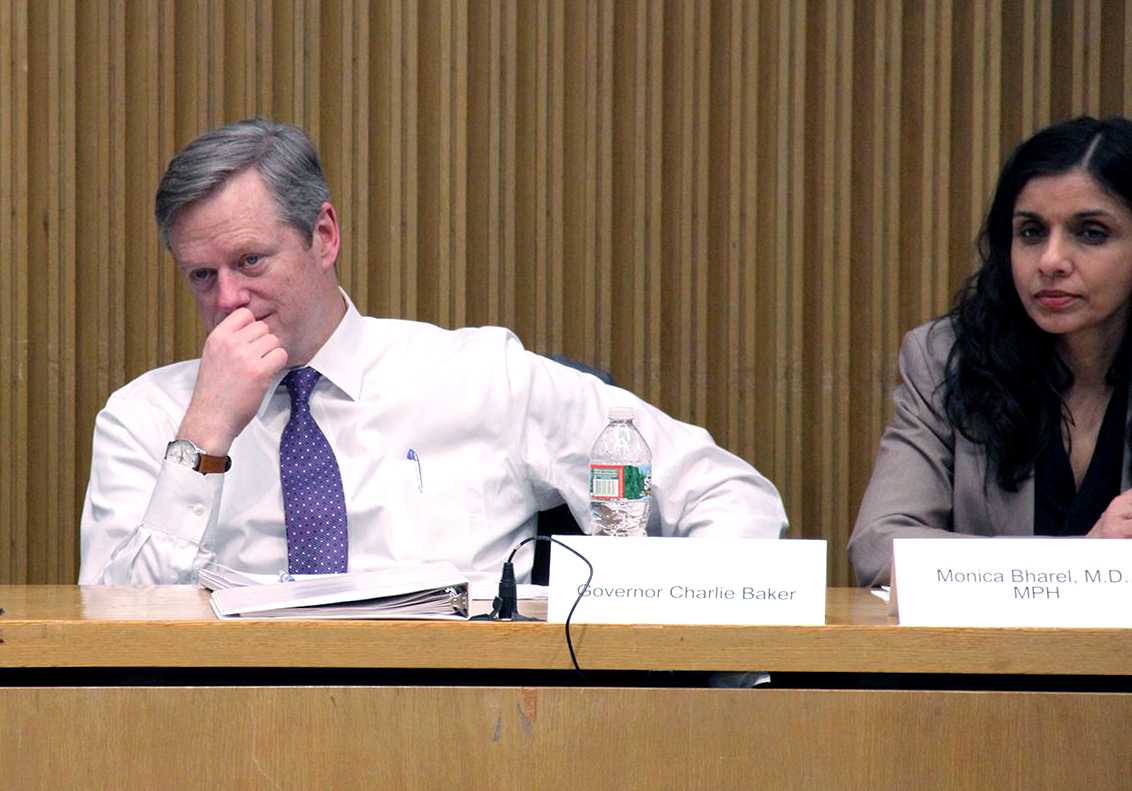[mediagrid cat=”19853″]
Massachusetts Gov. Charlie Baker and the Opioid Crisis Working Group met in the State House Thursday for a public forum for residents to voice their concerns about the rising rate of opioid overdoses in Massachusetts.
Companies, family members, social workers, nurses and recovering addicts gathered in a group of approximately 200 people to share their personal experiences with the opioid crisis and speak about possible solutions to the problem.
Baker announced the 17-member Opioid Crisis Working Group on Feb. 19. The group is headed by Marylou Sudders, secretary of the Massachusetts Executive Office of Health and Human Services.
“In order to formulate solutions, we need to understand the depth of this devastating problem that is affecting families, friends and neighbors across the Commonwealth,” Sudders said in a Thursday press release. “This session will give us a chance to hear directly from those most impacted by this issue.”
This forum was the fourth in a series of public sessions across the Commonwealth to foster conversation about the opioid problem. Baker said he was excited to hear from the community to create real change throughout Massachusetts.
“We are looking forward to the results of this so that we can be active and aggressive in pursuing work with you and our colleagues in government health care and education,” Baker told attendees at the forum. “We need to be open and honest with ourselves about the way we all, as a society, think with respect to all substances, including opioids, before we move forward with this.”
In 2014, there were three times as many deaths associated with opioid overdoses than associated with automobile accidents, Baker said. Many people commented on the stigma behind addiction as a main factor in improving the opioid problem in Massachusetts.
Jack Kelly, a speaker who ran for City Council in 2013 while publicly revealing that he was a recovering heroin addict, told the audience why he was so open about his condition.
“It’s important that people know that coming off of heroin allows for possibilities to actually be in recovery and actually have a life,” Kelly said. “We cannot get rid of the stigma until people like myself are in positions of power to prove that recovery is truly possible.”
Another popular topic of conversation for those in attendance was the treatment of recovering women. Many women came to the panel to talk about the lack of beds available to them when attempting to begin their recovery.
Molly Dugan, a representative of short-term residential support service Women’s Hope, a part of Women’s Victory Programs, voiced the concerns of the women in her program.
“This winter, when I was referring women to halfway houses and being told that there was a six to eight week waiting list, we had nothing to do with them,” Dugan said. “I hope you take away today that you need more services for women.”
Many of those in attendance expressed excitement about the attention being brought to the issues, as well as the anticipation to find a solution.
Michael Kane, executive director of Mass Alliance of Housing and Urban Development Tenants, said the hearings are going well, and he hopes the governor’s office is listening.
“It’s very powerful to hear both the people that are affected testifying so powerfully but also the really thoughtful, effective recommendations to affect the crisis, and I hope the governor and his staff are listening because there are a lot of things that can obviously be done right away,” Kane said.
Julia Reddy, 30, of Roxbury, said she hopes the forum will open up conversations about other dangerous substances.
“There were some really strong people recently elected to some really important positions, such as Marylou Sudders,” Reddy said. “Personally, I’m working with pregnant, homeless women, and I wish that the opioid conversation could also be widened to discuss alcohol and fetal effects of alcohol use during pregnancy, also tobacco use.”
Jo-Ann Rivieccio, 61, of Charlestown, said she has been affected by the loss of a loved one due to opioid addiction, and hopes that one day, no one will have to go through what she did.
“I had a son that died of an opioid overdose back in 2009,” she said. “It’s been almost one year now that [Massachusetts] Governor Deval [Patrick] had said that we have an epidemic here. It’s a year later and how many people have we lost in 2014? I think we’ve talked enough. How many more people are we going to lose? How many more children are we going to lose? It’s just not right.”























































































































